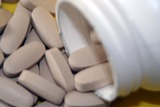Anti Antioxidant
German Study Pooh-Poohs Antioxidant Benefits
 There’s no news like bad news, and once again, the media have illustrated this axiomatic truth.
There’s no news like bad news, and once again, the media have illustrated this axiomatic truth.
For years, I and others in the natural health world have written about the array of benefits antioxidants provide the body. How antioxidants neutralize free radicals, how they diminish the risk of an assortment of diseases and how they slow the aging process.
These positive benefits haven’t been hid by the media, but they’re rarely afforded the headline status they deserve. This is mostly because it’s not perceived as news – people just seem to take the benefits of antioxidants for granted whenever a new study comes out on just how effective they are in contributing to overall well-being.
But if a study comes out slamming antioxidants as phony and destructive to health? Now that’s a story. It’s the classic journalism credo of “’Dog bites man’ isn’t news, but ‘Man Bites Dog’ is.”
Well ladies and gentlemen, that’s just what we have today, as a study’s been released that actually pooh-poohs the benefits of antioxidants. The researchers say that antioxidants actually “block the positive benefits of exercise on metabolism.”
Now that’s chutzpah!
German researchers came to this conclusion after recruiting approximately 40 men to participate in a four-week study that tested their athletic ability (85 minutes of cardio). The recruits were both trained and untrained as far as overall fitness goes, and approximately half were assigned to take vitamin C and E supplements following exercise. The other half took a placebo.
At the end of the study, the researchers came to some surprising – and in my and others’ opinions, flawed – conclusions. The group that took the placebo showed some improvements in their metabolism, in that their bodies were better able to control and regulate blood sugar (one of the many benefits reaped from regular exercise). But this wasn’t the case for those who took the vitamin E and C supplements. They showed no improvements in insulin resistance.
The researchers chalk it up to antioxidants’ blocking reactive oxygen, and because of this, antioxidants might, get this, increase the risk of type II diabetes!
Again, that’s chutzpah!
The sensationally specious study is published in the journal Proceedings of the National Academy of Sciences.
I could go into great depth as to why this study should be taken with a grain of salt, and it starts with the fact that it was so small and only involved men. But thankfully, there’s been a lot of reaction within the scientific community that epitomize my line of thinking in a more reasonably argued way, so I’ll let one of them speak on my behalf.
One of whom is Dr. Alexander Schauss. Speaking to NutraIngredients.com, Dr. Schauss of the AIBMR Life Sciences Center, an organization dedicated to natural products research, said that the study is flawed on its face because the German researchers asked trained and untrained athletes to perform the same amount of aerobic activity. Naturally, the lab tests of an untrained person’s body will react differently than those of a trained athlete.
Secondly, much of the German researchers’ data was incomplete. For instance, they collected muscle biopsies from some of the recruits, yet not for others.
Another one of his criticisms hearkens back to my media criticism, in that while the researchers pooh-pooh antioxidants benefit to exercise, they don’t say there’s any negative effects associated with vitamin E and vitamin C. Yet the headlines around the world imply this untruth all day long (e.g. “Do Antioxidants Curb an Exercise Benefit,” “Antioxidants Blunt Exercise Benefit,” “Vitamins Undo Exercise Efforts”).
I’m hoping we’ve all reached the point where we can’t judge a book by its cover. You have to really read a study or article before coming to any conclusions.
This is a classic case of why you shouldn’t always take studies as gospel. Because sometimes, they’re written just to get attention.
And all too often, the media are happy to oblige.
Sources:
nutraingredients.com
nutraingredients.com
webmd.com
Related Posts
- Antioxidant Rich Foods Improve Immune Function and Increase Lifespan, Study Shows
- Natural Antioxidant Slows Oxidation of Frying Oils, Study Suggests
- “Cloudy” Apple Juice Contains Higher Level of Antioxidant Activity Than “Clear” Juice
- Major UK Pharmacy to Sell Anti-Impotence Drug Viagra Over The Counter
 
|
Enjoy this article? We guarantee your privacy. Your email address will NEVER be rented, traded or sold. |
Visit my new site: Self Help On The Web
 |
 |
Posted: May 13th, 2009 under antioxidants, Exercise.
Tags: antioxidants, Exercise, Vitamin C, Vitamin E







Comments
Comment from martegale
Time May 14, 2009 at 12:48 am
I recall from some science class in college – the professor telling us that scientific studies are often skewed because the researcher sets out not to learn the truth, but to prove something.
Therefore all the research he or she gathers is slanted to prove that theory. Anything that disproves it is ignored.
As for the media – you’re absolutely right. Bad news makes better headlines.
Comment from kgopalrao
Time May 28, 2009 at 5:29 am
If yr comments were restricted to saying the study was flawed, accepted. But yr comment on the conclusions, i.e “…while the researchers pooh-pooh antioxidants benefit to exercise, they don’t say there’s any negative effects associated with vitamin E and vitamin C…”, does not seem logical. They have clearly implied the negative effects of vita-C/E, they dont have to state it, and the media has logically picked up this implication. Best to stick to the flawed nature of the study, and not challenge the logic of the conclusions, since by implication that accepts the unflawed nature of the study.